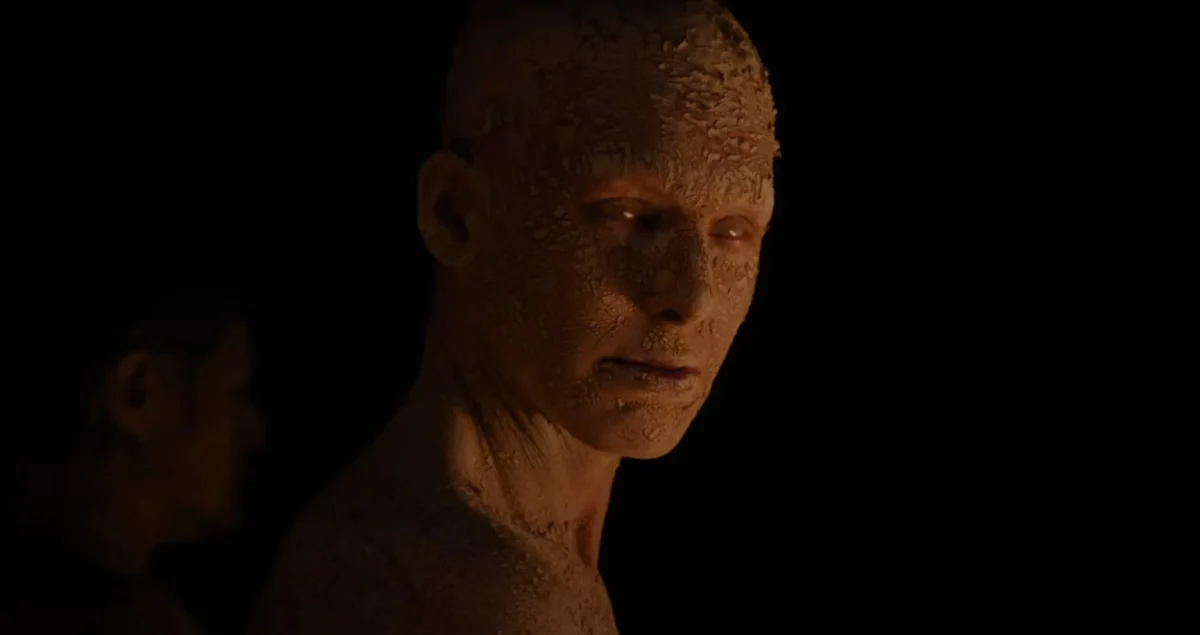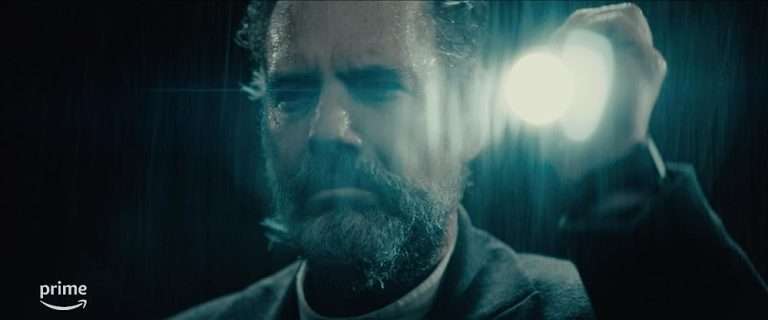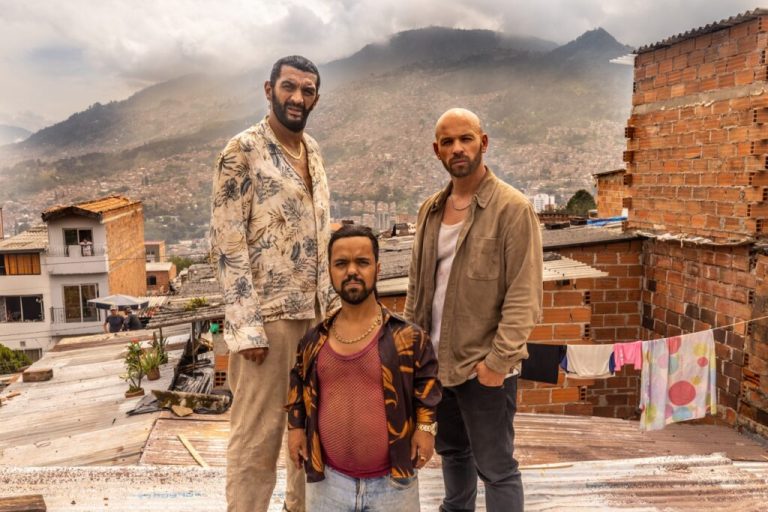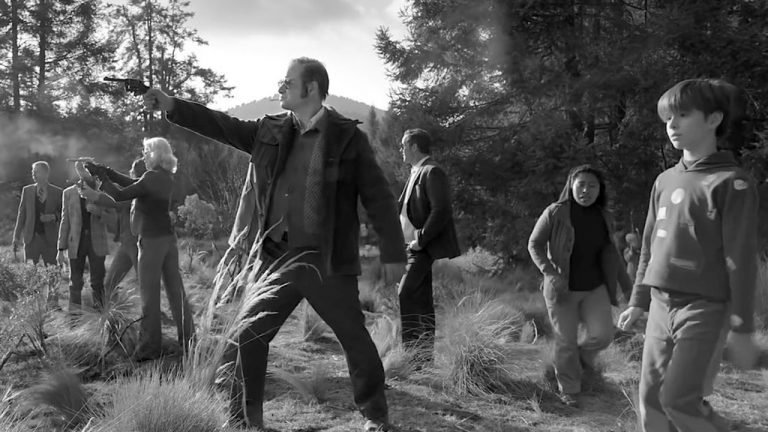Julia Max’s “The Surrender” (2025) works as a meditation on guilt, grief, and loss. It doesn’t succeed because it’s a tonal mess, unable to reconcile its heavier themes with personal portraits of a family shattered by immediate, immense tragedy. There’s a lack of cohesion, the scattered narrative barely pulling together. This tale of perspective shifts is foggy. When there’s a gulf in communication, how do people navigate what needs to be said, what ought to be done promptly?
The weight of the unsaid and unresolved lingers heavily over the film. Max, who has also written the film, wants to address the destabilising fallout of grief. Many problems are holding the film back from being an effective, sobering, chilling study of loss. What could have been genuinely unsettling, as delusions borne of immense grief, has no place in the film, an over-designed and yet peculiarly empty portrayal of individuals ill-equipped to tackle their aches.
The Surrender (2025) Plot Summary & Movie Synopsis:
Megan (Colby Minifie) is just back home – a place of deep conflict. She has evaded it for the longest time. But she needs money for her studies. She hopes her parents can help her out. But her father is severely ill, bedridden, and incoherent. Her mother, Barbara (Kate Burton), is the strenuous caregiver, administering him a heavy, constant dose of morphine. Barbara has always used voodoo; basically, whatever she thinks stands a shot at bringing her husband a streak of good health, some form of recovery.
Barbara has spent years attending to her husband, not letting Megan be aware of the severity. When Megan asks her for help with the fees for the scholarship, Barbara flatly dismisses her. There’s no money. But isn’t her father’s treatment covered by insurance? Barbara rebuts. Treatment is super expensive, and Megan feels helpless to pursue the matter any further.
Exhausted, Barbara wants to join her friends for dinner but balks at her husband’s demand for care. However, Megan insists that she go. She will watch over. Right after her mother leaves, Megan is a bit at sea, not confident how to tackle her father’s sudden anguished cries. She’s about to call her mother, but refrains and gives him morphine instead. When Barbara returns later at night, she injects another dose of morphine, unaware Megan had already done just a little earlier.
It might have backfired. The next morning, the father doesn’t wake up. He’s dead. But Barbara isn’t as shocked as Megan expects her to be. Megan discovers Barbara has hired a shaman to bring Robert back from the dead. Megan instantly protests, but Barbara is adamant. Robert’s vision assures Megan to cave into her mother’s request, otherwise she’d be pinned forever with the blame.
The shaman arrives, gruff and reticent and intimidating. Megan is immediately unsettled by his presence, as he pokes around and behaves peculiarly. Yet she keeps her cool, with her mother’s concern on her mind. She lashes out when she discovers her mother is paying her entire life savings to the shaman for fulfilling the act. Megan tries to reason with Barbara. How would they survive even if the father were to return?
How can she be so reckless when she had been rational her whole life? But it’s been done, the deal closed. A circle is sealed. Essentially, the spirit of the father has to be called back to the circle and put back into his body, and only then would they return home. However, things quickly go awry. Megan realises her father has revived in a demonic shape. The ritual had failed, yet Barbara follow the demon outside the circle, which ends up killing her.
The Surrender (2025) Movie Ending Explained:
Does Barbara get back her husband?

The final chapter of the film is essentially a patchwork of flashbacks, as Megan is transported back in time and witnesses things in her childhood from a different angle. She’d always considered her father supportive and a generous husband, but it turns out to be fallacious. Her mother had to struggle a lot on her own. Robert isolated her entirely from her own family, friends, and snuffed out any career possibility. This totally reorients Megan’s view of her father, which had been exalted.
Finally, Barbara returns in a strange, uncanny appearance, comes before Megan but the latter insists she knows it’s not her mother. Megan blows out the ashes and light erupts, closing the film. It’s an ambiguous ending which suggests she might have gone to be with her friends in the world of spirits. She doesn’t know how to get back and this is the only plausible option she has for now.
The Surrender (2025) Movie Review:
The film circles the glorified notions one may have of others. The mother tells the daughter that people show their worst sides to spouses. Megan has rosy ideas of her loving father. But as it unravels, it might be further from the truth. The film becomes a study of the lies memory conceals, and realities difficult to stomach, but ultimately, that which cannot be denied. Megan jostles and clashes with her mother over the rites that arguably can resurrect her father. She doesn’t believe in it, but her mother remains adamant.
Through their tiffs, the film sheds light on the differences in beliefs that emanate from living too closely with tragedy. The mother has seen loss at too close quarters, she’ll take anything that seems promising, even if it’s far-fetched. She had shielded Megan from an intimate, intense knowledge of the father’s terrible condition. Hence, Megan can’t relate to or see why her mother is driven to such depths. Their wrenching tussle and eventual reconciliation, done in shards, form the film’s fractured heart. But “The Surrender” needed to have more emotional conviction, a wiser sense of the frays at the centre, the chasms between perception and actual truth.
Max is unable to clearly and lucidly assemble the film into shape. Hence, there are sketchy, under-baked detours into rituals that barely move or shock. The film has no punch or emotional consequence. It’s wrapped so sloppily that it fumbles landing even a few solid scares. What only transpires is a meandering narrative, unsure of how it wants to capitalise on its genre elements, take its dire undertones in the right, explosive direction. Even the slash of ambiguity in the ending isn’t as satisfyingly complex as it strains to be, coming off as undecided and limp.






![Sunrise [2014] Review: A Familiar Tale of Child Abduction Hinged between Reality and Fantasy](https://79468c92.delivery.rocketcdn.me/wp-content/uploads/2021/09/Sunrise-Arunoday-1-768x432.jpg)

